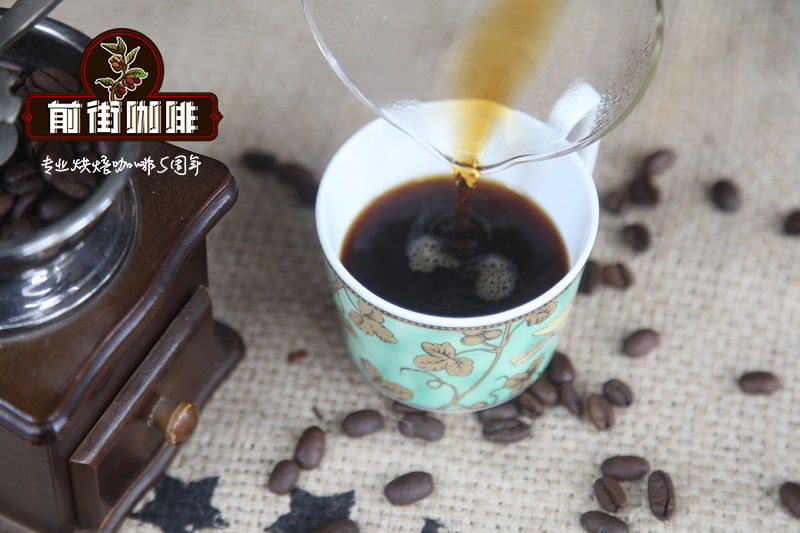Pu'er coffee what is the taste of Pu'er coffee in the back garden of Starbucks and Nestle?

Professional coffee knowledge exchange more coffee bean information please follow the coffee workshop (Wechat official account cafe_style)
"even Starbucks specifies to use the beans here."
When it comes to Yunnan Pu'er, apart from the famous Pu'er tea, it is also the largest coffee producer in China. Do you know?
Pu'er, with a unique climate and environment, has a latitude similar to that of Colombia and is quite suitable for coffee growth. the "small coffee beans" (Arabica species) produced by Pu'er, with a rich aroma, fruity aroma and slightly sour taste, are not only well-known in the international community. Even Starbucks, Nestl é and other big brands have come to cooperate, naming to use the beans here.
In the early days, the quality of coffee in Yunnan was not stable, and coffee beans were mostly sold to international groups at low prices. In recent years, the Yunnan government and coffee farmers have actively invested in improving planting and production technology, hoping to enter the international boutique coffee market. How does Pu'er coffee taste? Wouter DeSmet, director of agricultural services for Nestle Coffee in China, said Pu'er coffee has a mild taste and aroma, similar to coffee beans from Honduras and Guatemala.
Coffee experts commented that Pu'er coffee is "the best of the best coffee", comparable to Jamaica Blue Mountain Coffee.
Thirty years ago, Pu'er City was still called Simao area, Pu'er tea is not as thunderous as it is today. Li Zhongheng, who is already in his eighties, was once the deputy commissioner in charge of agriculture in Simao Prefecture. He is one of the witnesses of the cooperative relationship between Nestl é and Pu'er.
In the late 1980s, with China's opening up to the outside world, Nestl é actively entered China to open up the market and look for raw materials. By chance, Simao government had initial contact with Nestl é, and then Simao invited experts from the Chinese Academy of Sciences and Yunnan Academy of Agricultural Sciences to hold a discussion meeting in Simao. The conclusion of the study is that Simao's water quality, soil, altitude and climate are very suitable for growing coffee.
The reason why the early Yunnan coffee is not known, on the one hand, is that the market at that time is not mature, and on the other hand, it is because its own quality is not up to standard-most of the coffee beans received by large manufacturers here are used to make instant coffee, and the pursuit of quality is not strict. Of course, untrained farmers (the local name for coffee growers in Yunnan) did not know the secret. "the more fruit you pick, the more money you sell." it was probably a fixed mindset at that time, and the concept of so-called high-quality coffee beans probably didn't exist at all at that time. But now that is changing. Young people who have studied in big cities have brought new thinking here, and professionally trained agronomists are enthusiastically imparting what they have learned to hard-working farmers. A younger group of coffee buyers are also starting to collect coffee beans from Cannons in a more transparent and stringent way. The idea that "you can't grow coffee only, you have to grow it well" has gradually begun to become a local consensus, and the future of Yunnan coffee may be closely related to these enthusiastic and sincere young people.
Important Notice :
前街咖啡 FrontStreet Coffee has moved to new addredd:
FrontStreet Coffee Address: 315,Donghua East Road,GuangZhou
Tel:020 38364473
- Prev

What is Yunnan Pu'er "New Black Gold" small Coffee? is Pu'er Coffee good? is it of good quality?
Professional coffee knowledge exchange more coffee bean information please follow the coffee workshop (Wechat official account cafe_style)
- Next

The cat economy is crazy! The History and Space Culture of Cat Coffee how to Open a Cat Cafe
For more information on coffee beans, please follow the coffee workshop (official Wechat account cafe_style) author: Lin Runhua and Chi Hengchang bring a cup of hot tea and sit in the warm yellow light, perhaps in your house or in a warm coffee shop. With the fire that brings you warmth, the cat is leaning against you or sleeping on your lap. This is what many cat lovers yearn for most in winter.
Related
- What documents do you need to go through to open a coffee shop? coffee shop coffee shop certificate processing process
- How to purchase Coffee beans in small Cafe how to choose a suitable supplier for domestic Coffee supply Company
- How to drink Starbucks Fragrance White Coffee? how to make Australian White Coffee? what Italian coffee beans are recommended?
- The Story of Flora Coffee: the name of Flora Coffee Bean and the implication of the Flowers on Florna Coffee
- How much does a cup of coffee cost? How much is the profit of a cup of coffee? What is the profit of the coffee shop in a year?
- Yunnan small Coffee, known as "fragrant Coffee", introduces the characteristics of Alpine Arabica Coffee producing areas in Yunnan, China
- 2023 latest Starbucks full menu price list how much is a cup of Starbucks coffee what is better to drink the most popular hot and cold drinks recommended
- Starbucks different kinds of Coffee Price list Starbucks menu 2023 Top Ten Best drinks in Starbucks
- Starbucks Spring praise Comprehensive matching Coffee Bean theme Story Packaging implication and taste description
- The cost of a cup of coffee latte American coffee cost price and selling price

